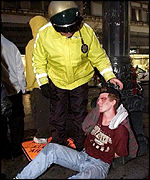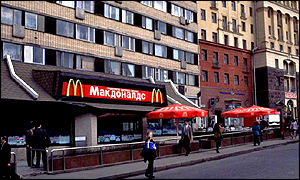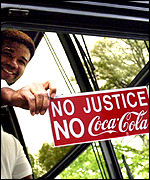

From London to Seattle, protesters have taken to the streets to vent their anger at 'globalisation'.
For the handful of companies which stand accused of world domination, the riots must make uncomfortable viewing.
But what really gives chief executives sleepless nights is the prospect of a more widespread consumer revolt.
So far, the world's appetite for Big Macs and Coca-Cola seems as keen as ever.
But pockets of resistance are undoubtedly forming.
Growing dissent
Growth markets embraced with glee in the early Nineties by McDonalds, Coca-Cola, Philip Morris and other US consumer giants, are proving more difficult to crack than expected.
Russia, in particular, where poverty has rendered the concept of brand loyalty largely meaningless for many people, is not being won over easily.
In the past year, long-neglected brand names from the Soviet era have started to make a comeback as consumers turn their back on all things Western.
The Coca-Cola Company, which led the charge of Western brands into Russia, has been forced to switch production to traditional Russian soft drinks, such as Kvas, a cloudy, brown yeast concoction.
Philip Morris, whose Marlboro cigarettes once epitomised Western sophistication for Russian consumers, has found more success recently with a brand called Peter the Great.
In France, the wave of public support for a farmer who wrecked a McDonalds restaurant was a sign that dissent had spread beyond the university campus.
Under attack
The concept of global marketing is also changing.
The one-size fits all approach, driven by a deep-rooted conviction that the world's people all aspires to the same, Western, lifestyle, is no longer working.
Richard Hammond, former vice-president of global operations at US advertising giant Bozell, believes the big players are having to tread very carefully indeed.
"Once you reach a certain level of consumer sophistication, there is a backlash against advertising and being told what to buy.
"Brand marketers have to be careful about how they proceed.
"They need to integrate into the community, rather than impose their values on it."
Mr Hammond, who left Bozell to found his own multicultural ad agency, Spirit, believes the world's consumers are maturing fast.
"Western marketers have misunderstood levels of intelligence and sophistication in emerging markets," he says.
"When Bozell launched Heinz tomato ketchup in Moscow we went on TV with an ad from the UK. We simply changed the end line.
"That wouldn't work now. You would have to use a group of young Russians."
He adds: "In India as well, people have tried to use the techniques they have used in other emerging markets, but they meet a higher level of education than they expected." Apart from anything else, the multinationals realise that the power of the brand - as a guarantor of quality and status - has its limits.
"There is a very narrow dividing line between globalisation and mediocrity," Tom Blackett, deputy chairman of influential brand consultancy Interbrand, Newall and Sorrell says.
"There is a danger that the brand becomes so widespread that it loses what makes it special."
The fact that companies such as Coca-Cola, Philip Morris and Nike invest so heavily in their brands makes them uniquely vulnerable to fluctuations in public taste.
Interbrand has estimated that $75bn of Coca-Cola's $140bn market capitalisation is tied up in the Coca-Cola brand name.
The way Coca-Cola's share price plummeted following a contamination scare in Belgium last year showed how fragile that name can be.
Now - after a string of further PR disasters - the company which wanted to teach the world to sing has a different mantra - "Think global, act local."
Regional offices which once had 'pattern' ads and formulaic marketing strategies foisted upon them by corporate HQ are being encouraged to think for themselves - or so the company would have us believe.

A new buzzword - 'glocal' - has been coined to sum up this newly responsive mood.
Better-informed
In the West, consumers are better-informed than ever, thanks in part to the internet, and are wising up to the marketing game.
"The car industry is a good example of consumers making more informed choices," Mr Blackett says.
"Skoda, which was once almost a joke, is going to be a really big brand.
"People now realise that - like supermarket cola - the product is essentially the same as the more expensive brand, in this case Volkswagen."

The anti-capitalism demonstrations in Seattle, London and elsewhere may have failed to impact on the multinationals' bottom line.
But they appear to have tapped into a wider sense of unease about the homogenisation of global culture.
This is something which the global consumer giants, with their market researchers and image consultants, will be painfully aware of.